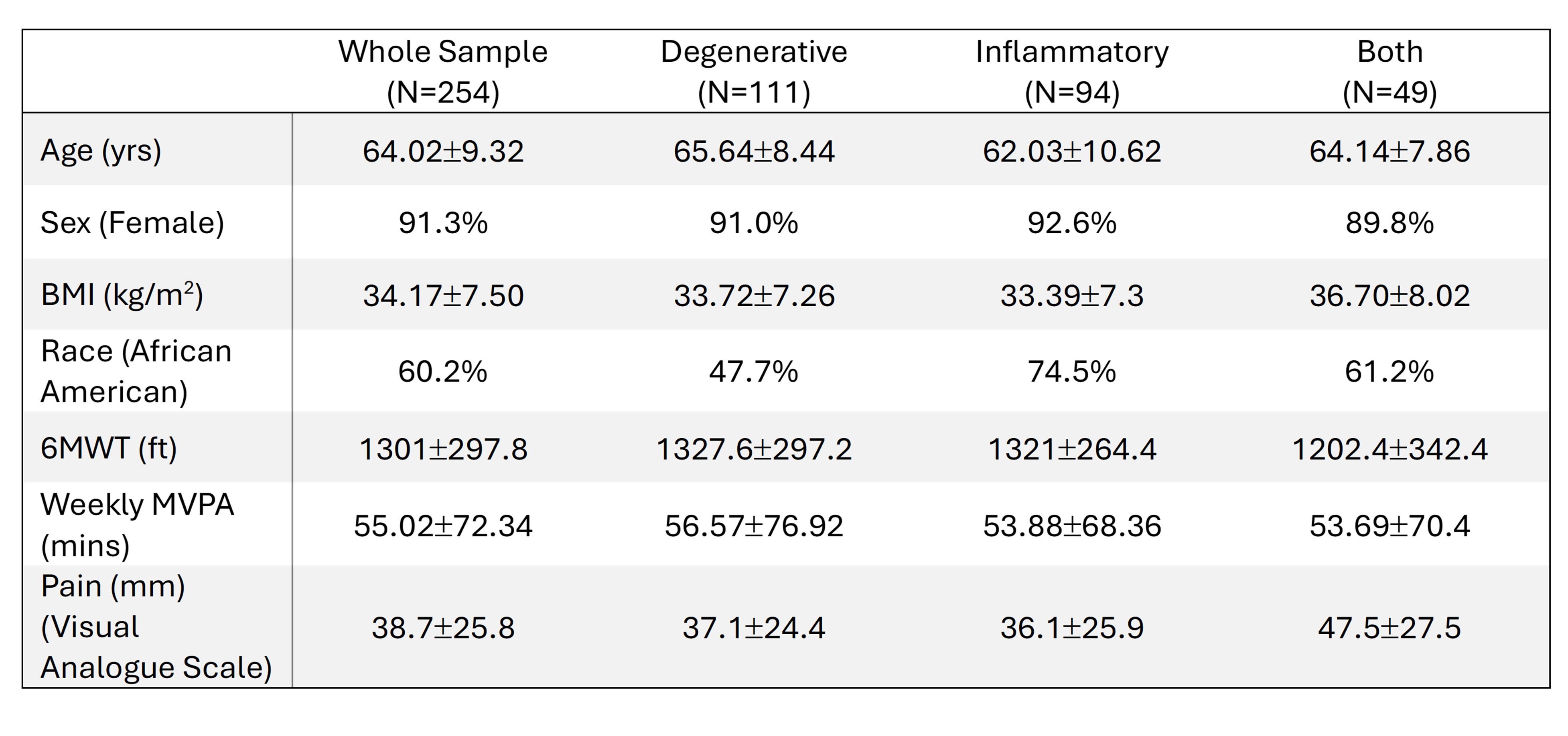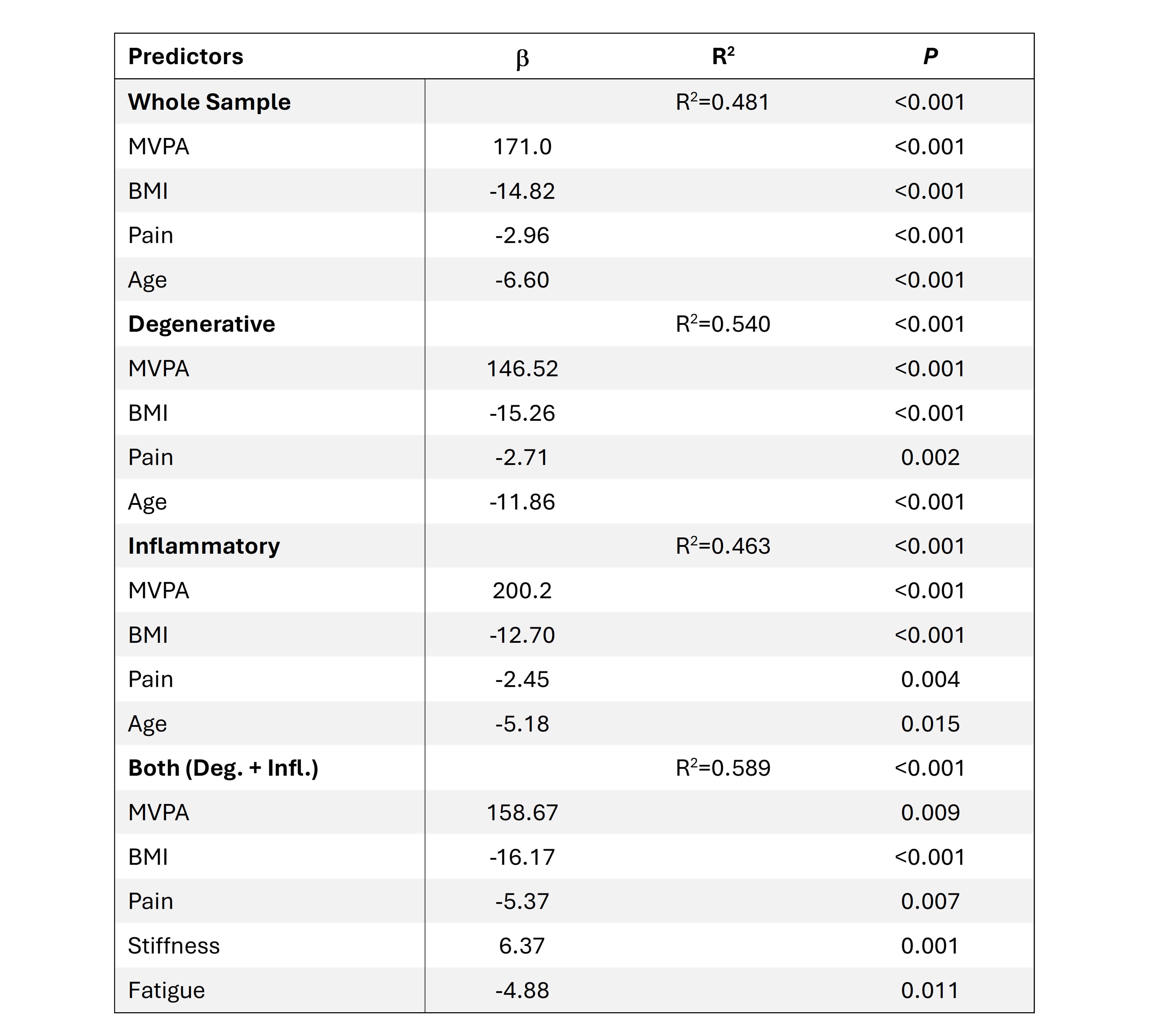Session Information
Session Type: Abstract Session
Session Time: 1:00PM-2:30PM
Background/Purpose: The 6-Minute Walk Test (6MWT) is a measure commonly used by clinicians to assess functional capacity and rehabilitation progress. While predictors of 6MWT performance have been identified in many populations, clinicians lack an understanding of factors that predict 6MWT performance in adults with arthritis. This study examined the predictors of 6MWT performance in adults with degenerative and inflammatory types of arthritis.
Methods: This is a secondary analysis from a randomized physical activity intervention examining a telephone-delivered version of the Walk with Ease program in adults with arthritis. Before randomization, participants completed the 6MWT to assess the distance (feet) someone can walk in 6 minutes. Participants also wore an ActiGraph accelerometer around their waist for 7 days to assess moderate–vigorous physical activity (MVPA). Weekly MVPA was log-transformed to conform with normal distribution of data. Stepwise linear regression was used to analyze the predictors of 6MWT performance in the whole sample as well as those with only degenerative arthritis (e.g., osteoarthritis), inflammatory arthritis (e.g., rheumatoid arthritis, fibromyalgia, lupus, gout, psoriatic arthritis, or Sjogren’s Disease), and those with a combination of both types of arthritis.
Results: Adults (n=254, age=64±9.3 years, female=91.3%, BMI=34.2±7.5 kg/m2, African American = 60%, 6MWT=1,301±298ft) with a diagnosis of degenerative arthritis (n=111), inflammatory arthritis (n=94), or a combination of both (n=49) were included in these analyses (Table 1). Higher MVPA, lower BMI, less pain, and lower age were significant predictors of better 6MWT performance in the entire sample of adults with arthritis (F(4, 247)=57.19, R2=0.481, p< 0.001), those with degenerative arthritis (F(4,106)=31.13, R2=0.540, p< 0.001), and those with inflammatory arthritis (F(4,87)=18.78, R2=0.463, p< 0.001). Among those with both degenerative and inflammatory arthritis, higher stiffness and lower fatigue were also included as significant predictors in the model (F(5, 43)=12.32, R2=0.589, p< 0.001) (Table 2).
Conclusion: Higher MVPA and lower BMI, age, and pain levels significantly predict better 6MWT performance in adults with arthritis. Interestingly, higher stiffness and lower fatigue also contributed to better 6MWT performance among those with both types of arthritis, but more research is needed to better understand these relationships. Clinicians can use this information to better develop an effective and tailored plan of care to improve functional capacity in this population, particularly among those with both degenerative and inflammatory arthritis. Further, given this sample’s low function compared to adults their age without arthritis, more research is needed to establish 6MWT normative values for adults with arthritis.
To cite this abstract in AMA style:
Horn K, Jamieson S, Devivo K, Wilcox S, Kim Y, Yang C, Pellegrini C. Predictors of 6-Minute Walk Test Performance in Adults with Arthritis [abstract]. Arthritis Rheumatol. 2024; 76 (suppl 9). https://acrabstracts.org/abstract/predictors-of-6-minute-walk-test-performance-in-adults-with-arthritis/. Accessed .« Back to ACR Convergence 2024
ACR Meeting Abstracts - https://acrabstracts.org/abstract/predictors-of-6-minute-walk-test-performance-in-adults-with-arthritis/


